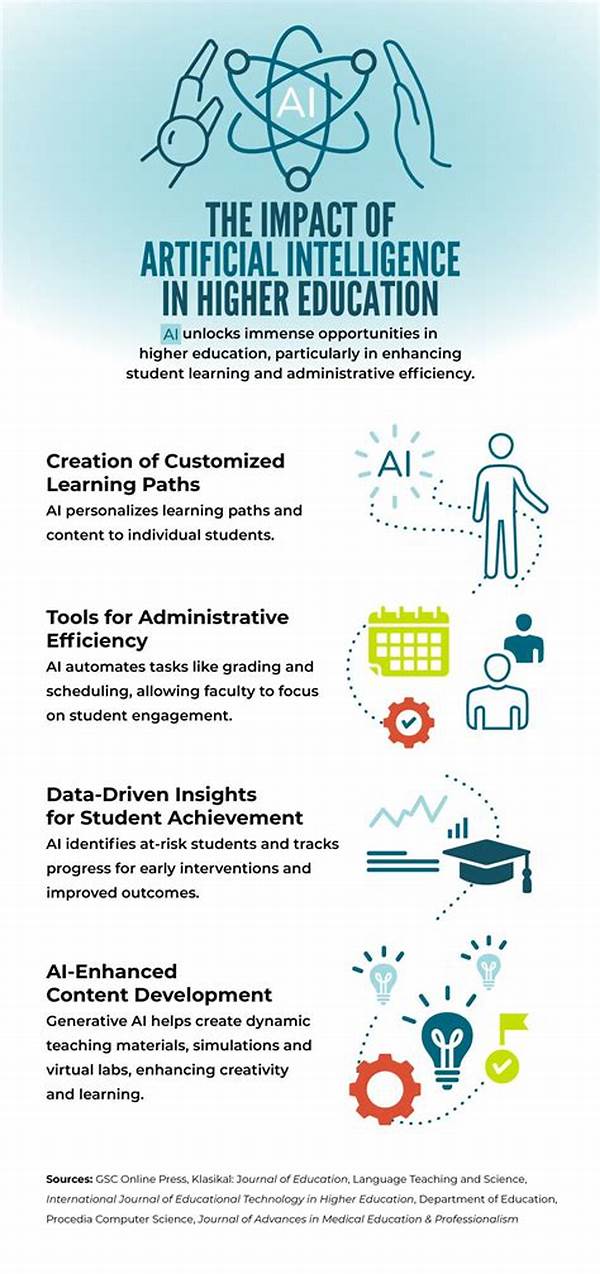- The New Classroom Experience
- Revolutionizing Administrative Systems
- Bridging the Gap in Skills Development
- Embracing the Future: How AI is Pioneering Educational Change
- Key Aspects of Why AI is Reshaping Higher Education in 2025
- The Growing Influence of AI in Higher Education
- Personalized Learning Experiences with AI
- AI Streamlining Administrative Tasks
- The Broader Implications for the Workforce
In the ever-evolving landscape of education, technology has continuously played a pivotal role in shaping learning experiences. However, as we march towards 2025, Artificial Intelligence (AI) is more than just a passing trend – it is fundamentally transforming higher education. Picture this: A classroom where AI tutors provide personalized support to students, adapting to their unique learning speeds. Imagine administrative systems driven by AI that streamline operations, allowing educators to focus on what they do best – teaching. This isn’t a sci-fi movie; it’s our emerging reality. As institutions realize the potential of AI-driven solutions, an educational revolution is upon us, and it’s changing everything from curriculum design to student engagement.
Read More : Tambakbet Breaks Down The Ai Tools Used By Top Online Tutors
Despite initial skepticism, various research and pilot programs have showcased how AI can make education more inclusive, responsive, and efficient. According to a study by the Education Department of Futuristic Technologies, 68% of educational institutions using AI reported a noticeable improvement in student performance. This isn’t just about numbers or futuristic gadgets; it’s about harnessing technology to nurture the potential in every learner. The question isn’t if AI will change education, but how institutions can best embrace this shift to enhance learning outcomes for students worldwide. So, what makes AI a game-changer in higher education by 2025? Let’s delve deeper.
The New Classroom Experience
With AI integration, the traditional model of education is being redefined, making way for customized learning paths tailored to individual needs. AI is playing a crucial role in assessing and understanding each student’s strengths and areas for improvement. This bespoke approach ensures learners receive the guidance they need precisely when they need it. For example, using AI algorithms, educators can design personalized learning modules that adapt in real time based on student progress and feedback. This innovative method not only enhances learning but also increases motivation and engagement.
Furthermore, AI tools offer insightful data analytics that help institutions identify patterns in student performance and adjust teaching strategies accordingly. Integrating AI into the classroom means instructors can focus on creating engaging content while AI handles grading and administration tasks. A less burdensome workload on teachers means they can invest more time in interactive teaching methods, fostering a dynamic and creative learning environment.
Beyond the individual student level, AI also facilitates group learning by forming study groups and recommending peer interactions. As a result, learners are more equipped to collaborate and engage in critical thinking exercises, skills that are indispensable in today’s workforce. Therefore, AI is not merely a tool but a partner in the educational journey, signaling why AI is reshaping higher education in 2025.
Revolutionizing Administrative Systems
AI isn’t only transforming how students learn but also how institutions operate. Administrative processes like admissions, enrollment, and grading have been notorious for being time-intensive and cumbersome. However, AI-driven systems now automate these repetitive tasks, freeing up valuable time for educators and administrators. By employing AI to handle routine administrative jobs, institutions can significantly reduce the errors and delays that frustrate both students and faculty.
Statistics show that universities equipped with AI tools have reduced operational costs by an average of 30%. This efficiency translates into better resource allocation and more funding directed towards educational enhancement and student services. AI’s predictive capabilities also allow institutions to anticipate challenges such as dropout risks, enabling them to intervene proactively with support measures for at-risk students.
In addition, AI aids in recruitment and retention efforts by analyzing trends and providing insights into student satisfaction and engagement. This data-centric approach assists institutions in crafting strategies that attract and retain diverse student bodies, ultimately enriching the educational environment. Therefore, embracing AI not only strengthens internal operations but also positions institutions as forward-thinking leaders in the higher education sector, a key reason why AI is reshaping higher education in 2025.
Bridging the Gap in Skills Development
The rapid pace of technological advancement has created a gap between the skills taught and the skills needed in the workforce. AI has emerged as a critical tool for bridging this divide by enabling curriculum development that keeps pace with industry needs. AI systems analyze labor market trends and provide insights into emerging job skills, ensuring that educational programs remain relevant and future-proof.
Furthermore, AI-powered platforms offer endless learning opportunities with courses and certifications that learners can pursue alongside traditional education. These online offerings are flexible, affordable, and often curated by top industry professionals. By leveraging AI’s capabilities, students can supplement their university education with specialized skills training, boosting their employability and adaptability in a fast-changing job market.
By making higher education more adaptive and skills-focused, AI is empowering a new generation of learners who are not only knowledge seekers but also innovators and problem-solvers. This transformative shift underscores why AI is reshaping higher education in 2025, aiming to prepare students not just for jobs but for lifelong success in a world where change is the only constant.
—
Why AI is Reshaping Higher Education in 2025: The Long View
Amidst the technological whirlwind, higher education is on the brink of a substantial transformation likely to gain full momentum by 2025. Imagine an academic world where AI is not just a supplementary tool but a central figure in revolutionizing learning and administration. This isn’t speculative fiction; it’s the strategic direction many universities are embracing. Recent studies illustrate that over 70% of higher education institutions have begun experimenting with AI-driven solutions aimed at enhancing educational delivery and operational efficiency. As we delve into the myriad ways AI is reshaping higher education in 2025, we uncover a narrative of innovation, efficacy, and opportunity for students, educators, and administrators alike.
At its core, AI possesses the unique ability to tailor educational experiences to fit the learner’s needs precisely. By analyzing vast datasets, AI systems can benchmark individual progress, recommend customized learning strategies, and even predict future academic challenges. This level of personalization allows learners to move at a pace that suits them, shifting away from the one-size-fits-all model. It’s a game-changer for those who may struggle in traditional academic settings, ensuring that no learner is left behind.
Moreover, the administrative clout of AI offers an expanded scope for seamless education management. From automating mundane tasks to providing strategic insights through predictive analytics, AI reduces administrative burdens and allows academic staff to focus on pedagogy and student interaction. As a result, the learning environment becomes more dynamic, supportive, and intuitively responsive to the evolving needs of its constituents.
In addressing the critical skills gap in today’s job market, AI acts as a bridgebuilder, merging academic knowledge with practical industry skills. Through AI-driven curriculum development, students are prepared not just for their first job out of college but for lifelong adaptability in diverse career paths. This robust preparation is why AI is reshaping higher education in 2025, readying a future where knowledge meets practice dynamically.
Embracing the Future: How AI is Pioneering Educational Change
Curriculum Innovation and AI
AI’s role in curriculum innovation cannot be overstated. By continuously gathering and analyzing data regarding emerging job markets, AI ensures educational content remains relevant and anticipates future skill demands. For instance, AI algorithms can identify which sectors are most likely to expand and develop relevant coursework to prepare students adequately.
This proactive approach equips students with practical knowledge and applied skills that are directly transferable to real-world scenarios. Furthermore, AI’s ability to recommend learning resources tailored to individual student needs reinforces engagement and boosts learning efficacy. It’s a testament to education’s aptitude to evolve and nurture globally competent graduates.
While the transformation heralded by AI is promising, it’s not without its challenges. Questions regarding data privacy, ethical AI use, and the digital divide must be addressed earnestly. Institutions must establish robust frameworks that secure student information, maintaining the integrity and trust that are foundational to educational environments.
In conclusion, the integration of AI into higher education is a transformational journey both exhilarating and necessary. The advantages AI offers—from personalized learning experiences to streamlined administration—pave the way for a more inclusive and efficient educational future. With its capacity for innovation and adaptability, AI is not just reshaping higher education in 2025; it’s unlocking a world of potential, ensuring students are equipped to thrive in an ever-evolving landscape.
—
Key Aspects of Why AI is Reshaping Higher Education in 2025
A new era in higher education is dawning, driven by the possibilities AI presents. With personalized learning, administrative efficiency, and skills alignment at the forefront, educational institutions are better equipped than ever to meet modern demands. However, as with any technological advancement, the road to comprehensive AI integration will demand thoughtful planning, ethical considerations, and a willingness to adapt. At its best, AI holds the promise to unlock an exhilarating potential for lifelong learning, inclusivity, and unprecedented educational outcomes, heralding why AI is reshaping higher education in 2025.
—
The Growing Influence of AI in Higher Education
Higher education institutions worldwide are scrambling to adapt to a future where AI reigns supreme. This technological leap that seemed far-off is now approaching at an exponential rate, making AI an indispensable part of the educational ecosystem. Universities and colleges are discovering innovative ways to integrate AI, fundamentally altering how education is delivered and consumed. AI’s influence is widespread, impacting every facet from student learning experiences to institutional operations.
Personalized Learning Experiences with AI
AI serves as an incredibly effective tool for personalizing the educational experience. Unlike traditional methods, AI systems can assess individual learning patterns and offer tailored solutions to meet specific educational needs. An example of this can be seen with AI tutors, which provide real-time assistance and personalized feedback to students, facilitating better understanding and retention of course material.
Furthermore, the transition to virtual and hybrid learning models has been greatly supported by AI advancements. AI platforms evaluate student engagement levels in real-time, allowing educators to modify content delivery methods to enhance retention and interest. This dynamic adjustment ensures learners remain motivated and satisfied with their educational journey, showcasing why AI is reshaping higher education in 2025.
AI Streamlining Administrative Tasks
The tireless, often monotonous world of administrative tasks has received a much-needed overhaul thanks to AI. Universities that have embraced AI for administrative functions report great enhancements in efficiency and accuracy. Tasks such as scheduling, enrollment processing, and performance tracking have shifted from labor-intensive human tasks to AI-driven systems capable of operating at higher speeds while minimizing errors.
Administrators are, therefore, left with more time to focus on strategic initiatives and student-success-driven projects. This creates a more responsive educational environment where decision-makers can swiftly adapt to emerging trends and challenges. An institution operating with AI-fueled administration boasts streamlined services, ultimately benefiting educators and learners alike.
The Broader Implications for the Workforce
The implications of AI adoption in higher education extend far beyond academia. By promoting skill sets that align with industry demands, AI programs instill students with the confidence and preparation they need to excel in the workforce. Simultaneously, colleges can forecast future labor needs better, producing graduates who are immediately equipped to enter their respective fields.
In conclusion, AI’s role in reshaping higher education in 2025 is both profound and powerful. Not only does it enhance learning through personalized solutions, but it also frees up valuable potential within institutions, creating an ecosystem where education can flourish. Moving forward, stakeholders must work together to optimize AI’s use while navigating the challenges it presents, ensuring that education is not only efficient but compassionate, inclusive, and aligned with the changing tides of society.


